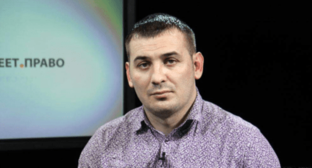18 August 2008, 17:45
Citizen war-reporter? The Caucasus test
Evgeny Morozov
18.08.2008
To watch Russian leaders and media make the public case for war with Georgia when the conflict was still in its infancy was also to wonder why at that point there was still so little factual evidence - particularly photos and videos - from observers on the ground in South Ossetia's capital, Tshkinvali. The Kremlin's spokespersons wanted the world to believe that the city had just suffered a Stalingrad-like devastation - though there was as yet no visible proof of the thousands of victims claimed.
It seemed a golden opportunity. After all, Time magazine had famously proclaimed "you" - that is, all of us - its "person of the year" in 2006. Surely news of the award, and the technology to act on it, had reached South Ossetia - so that at least one person would produce a conclusive account of how much damage had been inflicted on the city and its inhabitants. Where, in short, were the citizen journalists?
The screen of war
As the Caucasus war unfolded, those traditional media organisations that still had bureaus anywhere near that exotic part of the world struggled to fly in professional reporters. The Kremlin already had a head-start in winning its domestic public-relations battle: in the absence of much evidence to the contrary, its claims of more than 1,500 victims of "Georgian aggression" found a ready, and outraged, audience. Only later did humanitarian organisations such as Human Rights Watch release reports suggesting that the true number of casualties was much lower and that level of destruction had been greatly overstated; few in Russia seemed to be paying attention by that point.
The same pattern was repeated a few days later in relation to the small Georgian town of Gori, this time with the Russians (who had attacked it) playing the opposite tune. They responded to broadcasters' reports indicating that Georgian civilians had been killed by denying they had inflicted such damage, and dismissing the old-media images as "staged". It was a perfect opportunity for citizen reporters to fill in the gaps? The fact that they didn't in the first days of this quick war may reveal that - in war reporting at least - the great promise of citizen journalism is often an empty one.
True, it would be a great injustice to say that Russian and Georgian bloggers ignored the war: the sheer number of posts they wrote on the subject would overwhelm even the most voracious readers. The spectrum of views was wide - support and denunciation of both sides, predictions of an imminent third world war, claims that Russia was regaining its position on the world stage. But amid the outpour of online punditry, hard and facts-only reporting from Tshkinvali or Gori was missing.
There are good reasons, some of them very basic. A simple truth about modern conflicts is that they tend to occur in places without universal access to internet broadband and the low ratios of iPhones per capita. It would be sublimely naive - and condescending - to expect South Ossetians or Georgians to respond to intense shellfire by taking a crash-course in podcasting, even if they did have electricity and an internet connection. Tskhinvali and Gori were never going to be hubs of user-generated content from a war-zone.
And yet..some "citizen reports" from Tskhinvali and Gori have emerged despite the technological challenge. This is impressive and welcome, but it comes with a further problem: trust. Most were of poor quality, and many appeared on blogs with no reputation, no previous blogging history (some had been registered only a few days before the war), and carried no identification of a real person with a real name who could claim responsibility for ownership of them.
Beyond the technological and trust limitations, there is a visual one. To report war seriously and well is a subtle and complex task, requiring especial care where visuals are concerned. A house that looks devastated by shellfire may be one of the many such buildings in the neighbourhood, or it may be the only one; if the latter, it may have been damaged in an earlier conflict. The choice of what to show and the interpretation of what is shown can shape the public's attitude toward the war and its perpetrators. The public entrusts reporters to approach these issues fairly; and communicate their findings honestly, comprehensively and ethically. It is usually the venerable names and institutions that are the main repository of this trust, as is evidenced in the way that even small-scale manipulation by individual reporters (the "smoke in Beirut" image / Andnan Haji case of 2006) tend to backfire on the institution itself.
In this context, the citizen reports from Gori and Tskhinvali that I had seen triggered more questions than answers. How do I know that the many amateur photos circulating in the blogosphere had not been doctored or staged; and whose reputation would a revelation to this effect hurt? In the context of a full-blown information war (and PR war) being waged by both sides in domestic and international media, it is only to be expected that spin-doctors would try to use the blogosphere to spread misinformation.
The blogging balance
The few blogging accounts I did find enlightening were almost exclusively those written by people I had met on earlier trips to Georgia - and whom I trusted. It's probably true that - even if the narratives themselves were identical - I would be predisposed to trust accounts written by such people and not those from a group of anonymous bloggers. Even here, though, my friends' blogs helped me understand the horrors of this war from the (mostly Tbilisi) perspective of civilians caught up in it, and didn't offer details of what was happening around Gori.
Some Russian reporters present in the war-zone also turned to writing blogs, to overcome the self-censorship of their editors and newspapers, and to share the real story of Tskhnivali and elsewhere with their readers - not that of the Kremlin's spin-doctors. But these are still professional reporters representing the traditional media, paid to travel to the war-zone, who embraced blogging out of concern for their reputation and ethics - not themselves citizen journalists.
Thus, it had become clear a few days into the conflict that citizen journalists had in general failed to adequately cover its early and most crucial stages. The many traditional news organisations that had eagerly embraced user-generated content and made it part of their reporting strategy discovered this in a painful way - as (for example) CNN's iReport became a battleground in the propaganda wars between Russia and the west; most online commentators merely uploaded videos (usually recordings of their own pontification in front of a webcam) - with little factual reporting. Moreover, even if they did upload something that resembled even basic reporting, how would I know I could trust them? It's not enough that iReport belongs to CNN; after all, does CNN vet these videos as closely as those that were submitted by their in-house reporters, and if not, is this what can be expected of the "most trusted name in news"?
The democratic faultline
The crisis of citizen journalism revealed by the CNN experience also highlights a crucial but false assumption that such media companies have made: that everyday citizens would take the great risks associated with war reporting for the far-from-obvious benefits of being featured on a site like iReport. In addition, these organisations seem to have believed that the people who watched such reports would trust them as much as (say) Christiane Amanpour's. The satire of the iReport in The Daily Show's Jon Stewart in the United States still packs a punch:
"Yes, CNN wants you to spare them what is currently the most arduous part of what they do - reporting! And not just anywhere - apparently they want you to get as close as possible to an exploding building during a hurricane. 'Gee, this assignment looks dangerous. You know who'd be good for that story? John Q Schmuck'" .
This is not to deny the great value of citizen journalism in other circumstances - some even having to do with wars. For example, Iraqi bloggers' performed an invaluable function in reporting Iraq after the United States-led invasion of 2003, the Iraqi insurgency that followed, and daily life outside the Baghdad "green zone". At the same time, these two conflicts are very different. The war in Iraq had been intensively prepared and discussed in the media for months; news organisations' choice to have a reporter in or near Baghdad or not by the time the invasion occurred was not related to any expectation that others would do an equally good job with their cellphones.
South Ossetia, by contrast, did not even exist on the radar of many media companies before the conflict of August 2008 (though openDemocracy at least had and has published extensive analysis of the area and of wider conflicts in the Caucasus). The inattention is widely shared - after all, how many people knew about Srebrenica, Mogadishu, or Grozny before these places became known for great tragedy? But it is also damaging - for the world is bound to experience more Tskhinvalis and Goris.
The implication is serious for the future of democracy as well as for the future of media. The more citizen journalists are expected to fill the enormous gaps left by the establishment media as the latter struggle to redefine their business models (part of which means closing their foreign bureaus), the more the media play into the hands of leaders like Vladimir Putin and Dmitri Medvedev. They and those like them will always - as in South Ossetia - take advantage of media blackouts to create narratives favourable to their own political strategies. Citizen journalists are hardly appropriate sparring-partners for the Kremlin couple. But CNN and the BBC still are.
Source: http://www.opendemocracy.net/article/citizen-war-reporter




